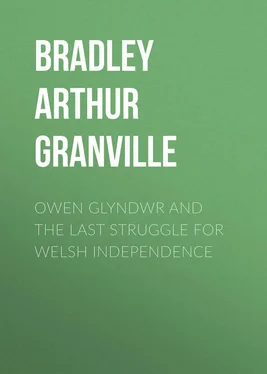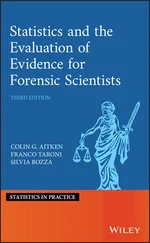Arthur Bradley - Owen Glyndwr and the Last Struggle for Welsh Independence
Здесь есть возможность читать онлайн «Arthur Bradley - Owen Glyndwr and the Last Struggle for Welsh Independence» — ознакомительный отрывок электронной книги совершенно бесплатно, а после прочтения отрывка купить полную версию. В некоторых случаях можно слушать аудио, скачать через торрент в формате fb2 и присутствует краткое содержание. Жанр: foreign_antique, foreign_prose, foreign_language, на английском языке. Описание произведения, (предисловие) а так же отзывы посетителей доступны на портале библиотеки ЛибКат.
- Название:Owen Glyndwr and the Last Struggle for Welsh Independence
- Автор:
- Жанр:
- Год:неизвестен
- ISBN:нет данных
- Рейтинг книги:5 / 5. Голосов: 1
-
Избранное:Добавить в избранное
- Отзывы:
-
Ваша оценка:
- 100
- 1
- 2
- 3
- 4
- 5
Owen Glyndwr and the Last Struggle for Welsh Independence: краткое содержание, описание и аннотация
Предлагаем к чтению аннотацию, описание, краткое содержание или предисловие (зависит от того, что написал сам автор книги «Owen Glyndwr and the Last Struggle for Welsh Independence»). Если вы не нашли необходимую информацию о книге — напишите в комментариях, мы постараемся отыскать её.
Owen Glyndwr and the Last Struggle for Welsh Independence — читать онлайн ознакомительный отрывок
Ниже представлен текст книги, разбитый по страницам. Система сохранения места последней прочитанной страницы, позволяет с удобством читать онлайн бесплатно книгу «Owen Glyndwr and the Last Struggle for Welsh Independence», без необходимости каждый раз заново искать на чём Вы остановились. Поставьте закладку, и сможете в любой момент перейти на страницу, на которой закончили чтение.
Интервал:
Закладка:
Llewelyn, having buried his wife Joan in the abbey of Llanfaes near Beaumaris, himself died at Aber in the year 1240, after a stormy but, judged by the ethics of the time, a brilliant reign of over half a century. His triumphs were of course for the most part military ones. But no Welsh Princes having regard to the decline of Cymric power had ever accomplished quite so much. He had forced his authority upon all Wales except the lordship Marches, but he had also been a sleepless patriot, driving the English arms back and greatly weakening the English influence throughout the whole Principality. With this scant notice of a long and eventful reign we must take leave of the warlike son of Iorwerth. He was buried at Aber Conway in the abbey he had founded; but his stone coffin was removed in later days to the beautiful church at Llanrwst, where amid the historic treasures of the Gwydir Chapel it still recalls to the memory of innumerable pilgrims “the eagle of men, who loved not to lie nor sleep, who towered above the rest of men with his long red lance and his red helmet of battle crested with a savage wolf, Llewelyn the Great.”
Wales, though rapidly approaching the era of her political extinction, was now so unusually strong and even aggressive that the English King was compelled to watch the course of events there with a vigilant eye. From the Welsh point of view it was of vital importance that Llewelyn’s successor in Gwynedd should be both acceptable to his people and strong in himself. Unhappily he was neither, unless indeed obstinacy may count for strength. Of Llewelyn’s family two sons alone concern us here. Griffith, the elder of these by a Welsh mother, has been already alluded to as going to war in such wild fashion with his father. Rightly or wrongly he was regarded as illegitimate, though that circumstance, it may be remarked parenthetically, was not such a vital matter in Old Wales. But his father’s marriage with an English King’s daughter suggests the possibility of making too light of a former and less distinguished alliance. Be that as it may, the younger of the two, the son of the Princess Joan and nephew of Henry III., succeeded in seating himself on his father’s throne, though not without protest from the Welsh nobility who did not by any means relish his English blood. Dafydd had all the English influence behind him, while his close connection with the King seemed to make for peace. But Griffith, the elder, in spite of his presumed illegitimacy, was the popular candidate, and Dafydd did not improve his own position by proceeding to strip his half-brother of his private property, and immuring his person in Criccieth Castle. All Wales protested. The Bishop of Bangor went so far as to excommunicate his temporal ruler, and King Henry himself on his distant throne expressed unmistakable disapproval of the whole business. But Dafydd cared neither for King nor Bishop. To the former he replied that if Griffith were at liberty there would be no peace in Wales, a possibility that seems by no means remote when one considers the performances of this young man in his father’s lifetime. Henry was not to be thus put off, and approached the Marches with a strong army. This unmistakable procedure and the almost unanimous support it met with from the Welsh nobility frightened Dafydd into a promise of submission. But the upshot of all this was not precisely what Griffith’s Welsh friends had expected. He was released from Criccieth, it is true, but only to be transferred to the Tower of London pending Henry’s decision as to his ultimate fate.
Much more important than this disposal of Griffith’s person was the extraction from Dafydd by his uncle of one of the most humiliating treaties ever wrung from a Welsh Prince, a treaty which might well cause his father, the great Llewelyn, to turn in his grave beside the Conway. Every advantage that Llewelyn’s strong arm had gained was tamely abandoned by his unworthy son. The Princes of Powys and South Wales were absolved from their oath of homage to the ruler of Gwynedd, which Principality shrank once more to the banks of the Conway. In the meantime Griffith with his young son Owen was left by Henry to languish in the Tower, till, filled with despair, he made a bold bid for freedom. Weaving ropes out of his bed-clothing he let himself down by night from his prison window; but, being a corpulent man, his weight was too much for such slender supports, and he fell from a great height to the ground, breaking his neck upon the spot.
The Welsh were greatly exasperated at the news, laying the death of their favourite most naturally at Henry’s door, and as the Marcher barons had been encouraged of late in their aggressions and tyrannies by the decline of Welsh strength, the time seemed ripe for another general rising. Dafydd now came out as a warrior and a patriot leader, and Wales rallied to his standard. He was, however, so appalled by the memory of the awful oaths of allegiance he had sworn to his royal uncle and the vengeance of Heaven he had invited in case of their non-observance, that he sent secretly a sum of money to the Pope, – all in fact he could scrape together, – begging for absolution. His Holiness granted this readily enough and professed to recognise his right to independence. But Henry, hearing of it, and disturbed by these manœuvres of the Vicar of God, secretly forwarded twice the amount of money sent by Dafydd to the Pope, who thereupon reversed all his previous decisions. We do not hear whether the Welsh Prince got his money back. He certainly got no value for it. So now in these years of 1244-45 war raged once more throughout Wales and the Marches, and Dafydd, though unendowed with his father’s warlike talents, nevertheless by his patriotic action regained the affection of his people. Henry was busy in Scotland and it was nearly a year before he could get to Wales in person; when he did, he pushed his way, with only one brisk fight, to that time-honoured barrier, the Conway estuary, and sat down with a large army of English and Gascons on the green pastures around Deganwy Castle, where he gazed with inevitable helplessness at the Welsh forces crowding on the marsh across the river, or lining the outer ramparts of Snowdonia that frown behind it. The troubles of King John, and even worse, befell his son. Matthew of Paris has preserved for us a “letter from the front” written by a knight, who gives a graphic description of the sufferings of the army, not forgetting himself in the narration of them. Cold, sickness, and hunger were their lot, varied by fierce skirmishes with the Welsh and desperate fights over the English provision boats, which made their way from Chester round the Orme’s Head into the Conway. Aber Conway Abbey was ruthlessly sacked by the English soldiery, much to the regret, it should be said, of our “special correspondent” and greatly to the rage of the Welsh, who in revenge slaughtered every wounded Englishman they could lay hands on.
No definite result accrued from this war. Dafydd died a few months after this amid the regrets of his people, whose affection had been secured by his later deeds. He had atoned for his former pusillanimity by the stubborn resistance which marked the close of his life. His death made way for the last and, to Englishmen, the most illustrious of all the long line of Welsh Princes.
Dafydd left no heir. Strictly speaking, his legal successor was a Norman, Sir Ralph Mortimer, who had married Gwladys, a legitimate daughter of Llewelyn. Such a successor was of course out of the question, and, as Henry abstained from all interference, the nobles of North Wales naturally fell back on the illegitimate branch, that of Griffith, who perished in the moat of the Tower of London. This unfortunate Prince, whose body was about this time removed to Conway and buried with great pomp, had three sons, Llewelyn, Owen, and Dafydd. It would seem as if all past experiences were lost upon the nobles of Gwynedd, since they were fatuous enough to appoint the two elder of these Princes to the joint rulership of their province. The partnership survived an English invasion which Henry made on hearing that the chieftains of South Wales were calling on the new Princes of Gwynedd to aid them, in the belief that a diversion would be opportune. Once more the English appeared on the Conway. As usual, the Welsh with their stock and movables had slipped over the river into the impregnable wilds of Snowdonia, and the King returned as he went, burning St. Asaph’s Cathedral on his march. There was now peace in Wales for some years; a lull, as it were, before the great conflict that was to be the end of all things. But peace and plenty, in the words of the chronicler, “begat war.” For want of enemies the two brothers turned their arms against each other. Owen, the younger, was the aggressor in this instance, and he justly suffered for it, being overcome by Llewelyn and immured for the rest of his life in the lonely castle of Dolbadarn, whose ivy-mantled shell still stands by the Llanberis lakes.
Читать дальшеИнтервал:
Закладка:
Похожие книги на «Owen Glyndwr and the Last Struggle for Welsh Independence»
Представляем Вашему вниманию похожие книги на «Owen Glyndwr and the Last Struggle for Welsh Independence» списком для выбора. Мы отобрали схожую по названию и смыслу литературу в надежде предоставить читателям больше вариантов отыскать новые, интересные, ещё непрочитанные произведения.
Обсуждение, отзывы о книге «Owen Glyndwr and the Last Struggle for Welsh Independence» и просто собственные мнения читателей. Оставьте ваши комментарии, напишите, что Вы думаете о произведении, его смысле или главных героях. Укажите что конкретно понравилось, а что нет, и почему Вы так считаете.












